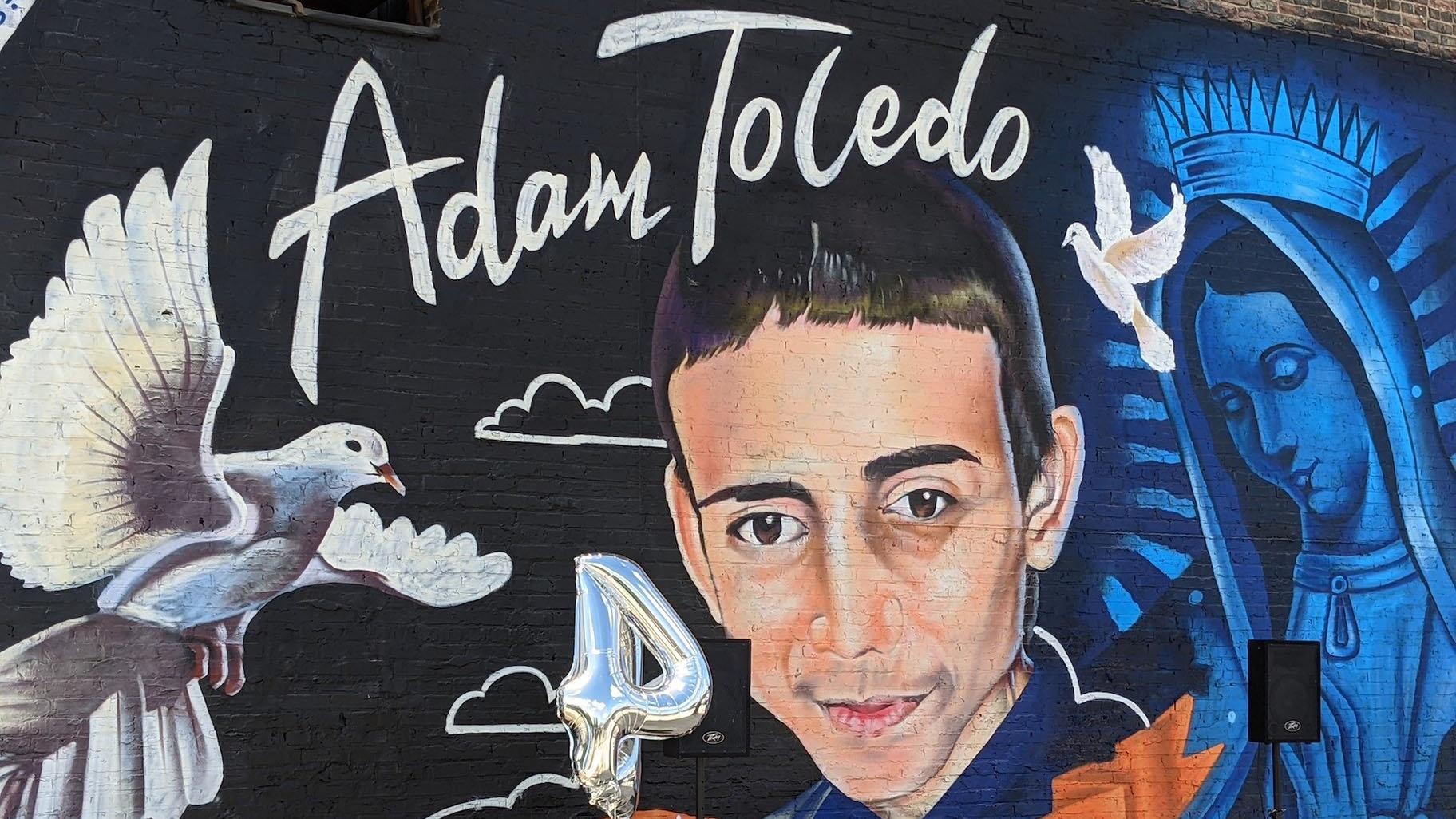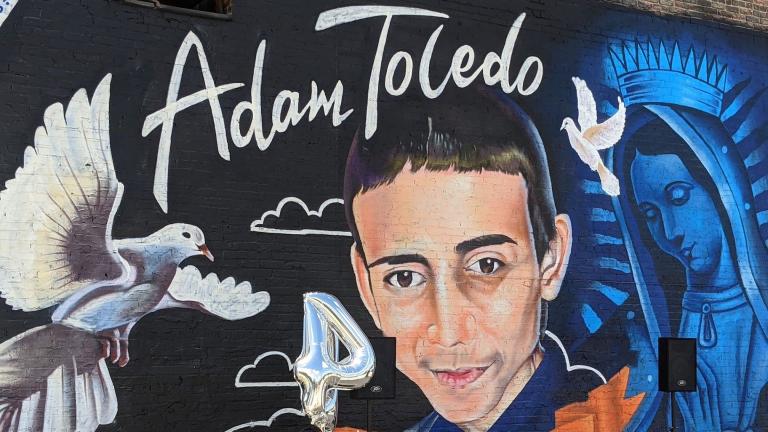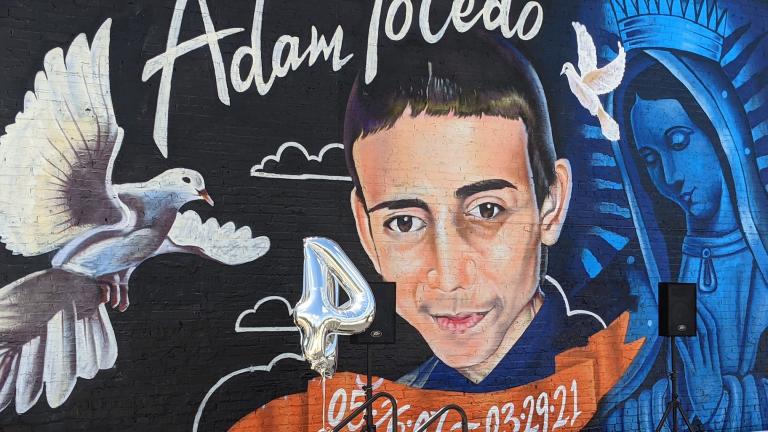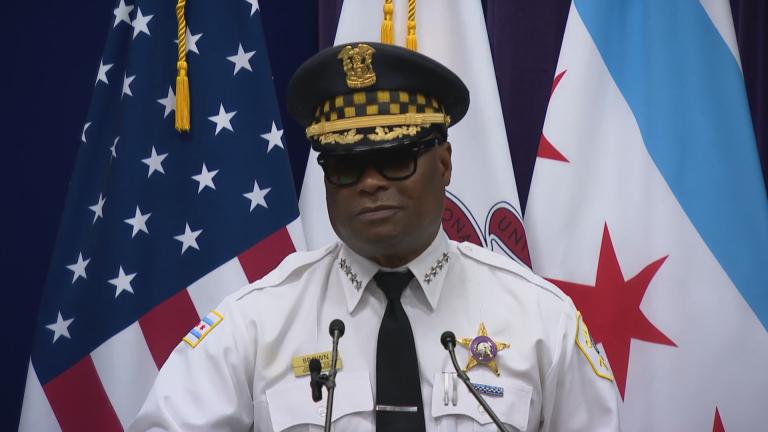 A mural of Adam Toledo painted by Milton Coronado. (Matt Masterson / WTTW News)
A mural of Adam Toledo painted by Milton Coronado. (Matt Masterson / WTTW News)
More than 1,000 days ago, Chicago Police Officer Eric Stillman shot and killed 13-year-old Adam Toledo after a brief foot chase, spurring demonstrations and renewed calls for police reform.
Stillman has yet to be disciplined in connection with Toledo’s death, despite being on leave since the March 29, 2021, shooting in a Little Village alley.
Whether Stillman is ever held publicly accountable for his decision to open fire in the instant that the 13-year-old turned toward him and put his hands in the air and began dropping a firearm depends on whether the Chicago City Council votes this week to reaffirm their rejection of an effort backed by the city’s largest police union to upend the system used for 60 years to punish officers.
The Chicago Police Board began weighing whether to terminate Stillman in April, an indication of how long it takes before a Chicago police officer can be fired for serious misconduct. The first public hearing in the proceedings that could lead to Stillman’s termination is set to start at 10 a.m. Feb. 5, with the hearings running through Feb. 9.
But those hearings will be canceled if the City Council votes Wednesday to accept a decision by an arbitrator that officers facing termination or a suspension of at least a year have the right to choose how their cases are resolved.
That would allow Stillman to request that an arbitrator, who must have the blessing of union leaders, be appointed to decide his punishment after proceedings that will take place behind closed doors.
If at least 30 members of the Chicago City Council affirm their December vote, a fierce legal fight will ensue over the city’s ability to publicly hold officers accountable.
Focus on Eric Stillman
The Civilian Office of Police Accountability, the agency charged with investigating police misconduct known as COPA, determined that Stillman should be fired for shooting Toledo, finding that he violated the department’s use of force policy by shooting the unarmed 13-year-old and violated his training on foot pursuits.
Former Chicago Police Supt. David Brown objected to that conclusion, instead recommending that Stillman be suspended for five days for failing to activate his body-worn camera when required.
That disagreement meant it was up to a randomly chosen member of the Chicago Police Board to determine whether Brown met “his burden of overcoming” COPA Chief Administrator Andrea Kersten’s recommendation.
Former Chicago Police Board President Ghian Foreman, who remains on the board, was randomly chosen to decide whether to uphold the superintendent’s decision or send the matter to the full police board.
In a four-page ruling, Foreman determined that Brown had not met his burden to overturn Kersten’s recommendation that Stillman be fired, sending the matter to the full Police Board for a full evidentiary hearing and public vote.
Foreman said in that decision that “a Police Board hearing that provides due process to all parties is necessary to determine whether Officer Stillman violated any of the Chicago Police Department’s Rules of Conduct and, if so, the appropriate disciplinary action.”
Cook County State’s Attorney Kim Foxx declined to file criminal charges against Stillman in connection with the death of Toledo.
Toledo was carrying a firearm in his right hand, but began dropping it and tried to put his arms in the air as he turned to face Stillman, who then fired one shot at the boy, striking him in the chest, according to video captured by the Stillman’s body-worn camera.
Foxx said these actions occurred “within one second.”
Stillman’s belief that he was in danger of imminent harm was reasonable “given the totality of the circumstances surrounding the incident,” Foxx determined.
Toledo’s family has filed a lawsuit against Stillman and the city of Chicago “in our effort to get justice for Adam and the Toledo family” and called for Stillman to be fired.
New Scrutiny for Police Accountability System
The hearings to determine whether Stillman should be fired would have been a high-profile test of the complicated system that is designed to hold officers accountable for misconduct under any circumstances.
But the fact that the disciplinary proceedings against Stillman are set to take place while the City Hall spotlight is focused on the accountability system as a whole means the pressure on the City Council will be intense.
Mayor Brandon Johnson and his allies had planned to hold a vote on the issue Jan. 24, only to call that off amid concerns they did not have the needed vote numbers. Instead, they sent the measure to the Workforce Development Committee, which voted 10-5 on Tuesday to affirm the earlier rejection.
No member of that panel changed their vote, with Alds. Anthony Beale (9th Ward), Peter Chico (10th Ward), Martin Quinn (13th Ward), Derrick Curtis (18th Ward) and Nicholas Sposato (38th Ward) voting to uphold the arbitrator's ruling.
The union has already challenged the city’s rejection of the arbitrator’s decision in Cook County Circuit Court. A hearing in that case is set for Jan. 31, the same day the City Council is next scheduled to meet.
Johnson has said he is willing to fight the Fraternal Order of Police, Lodge 7, to prevent the police discipline system that has been in use for the past 60 years from being upended.
“Police officers who are accused of some of the most heinous acts of misconduct, the public deserves an opportunity to see how that process proceeds,” Johnson said. “Anything less than that is, it’s not transparent.”
Contact Heather Cherone: @HeatherCherone | [email protected] | (773) 569-1863






